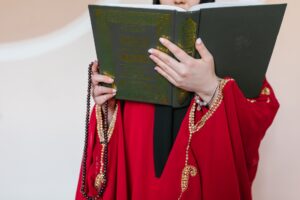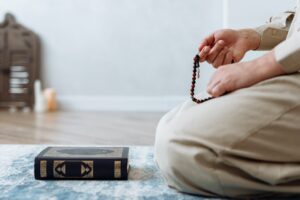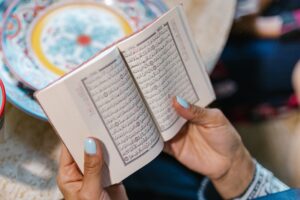Many Muslims are confused about the topic of Ruqyah. What exactly is Ruqyah and do you have to have some specific credential or skill to perform it?
Let’s first begin with what ruqyah exactly is
Ruqyah is at the same status of a dua’a, it is nothing more than the recitation of specific Quranic verses or saheeh hadith which are known for seeking refuge in Allah.
More specifically these ayat are said to be a source of healing. Specifically from ailments and sickness, for protection from the evil eye and exorcism of Jinns, or from sihr (meaning black magic or witch-craft).
You do not need to be skilled in order to perform Ruqyah.
In fact, what is best and most perfect is to recite ruqyah yourself, to ask others would be permissible but there are things which are better done by the individual themselves. Performing ruqyah is not complicated, you could begin by simply recite Surah fatiha or the Al-Mu’awwidhaat (Surah Falaq and Surah Nas).
These are regarded as the verses of refuge and it is the Sunnah that the Prophet (ﷺ) used to recite them when he was sick.
WHAT IS SIHR (BLACK MAGIC) AND IS IT EVEN REAL?
Sihr is definitely real and refers to black magic or witchcraft. In Islam it can be learned by someone who has the knowledge and is a serious crime. There are many passages in the Quran which are testament to it’s danger.
In Surah Baqarah ayah 102 Allah says,
And they followed [instead] what the devils had recited during the reign of Solomon. It was not Solomon who disbelieved, but the devils disbelieved, teaching people magic and that which was revealed to the two angels at Babylon, Harut and Marut. But the two angels do not teach anyone unless they say, “We are a trial, so do not disbelieve [by practicing magic].” And [yet] they learn from them that by which they cause separation between a man and his wife. But they do not harm anyone through it except by permission of Allah . And the people learn what harms them and does not benefit them. But the Children of Israel certainly knew that whoever purchased the magic would not have in the Hereafter any share. And wretched is that for which they sold themselves, if they only knew.
And In Surah Yunus Ayat 81,
And when they had thrown, Moses said, “What you have brought is [only] magic. Indeed, Allah will expose its worthlessness. Indeed, Allah does not amend the work of corrupters.
HOW TO PERFORM RUQYAH:
The exact process is to make supplication to your palms just as you would when making a dua’a. After blow into your hands and wipe the area which is causing pain or discomfort.
When Prophet Muhammad used to become very ill, Aisha would have done this for him as reported in the following hadith.
Narrated by Aisha:
Whenever Allah’s Messenger (ﷺ) became sick, he would recite Mu’awwidhat (Surat Al-Falaq and Surat An- Nas) and then blow his breath over his body. When he became seriously ill, I used to recite (these two Suras) and rub his hands over his body hoping for its blessings.
Reference: Sahih al-Bukhari 5016
QURAN VERSES FOR RUQYAH:
Here’s a list of the different verses from the Quran which can be recited.
- Surah Fatiha
- Surah Falaq
- Surah An-Nas
- Surah Ikhlas
- Ayatul Kursi (Surah Baqarah ayat 255)
- Surah Al A’raf Ayat 106-122
- Surah Taha Ayat 65-69
- Surah Al-Kafirun
SUPPLICATION FOR RUQYAH FROM HADITH THAT CAN BE RECITED:
Aisha (May Allah be pleased with her) reported:
When the Prophet (ﷺ) visited any ailing member of his family, he would touch the sick person with his right hand and would supplicate: “Allahumma Rabban-nasi, adhhibil-ba’sa, washfi, Antash-Shafi, la shifa’a illa shifa’uka, shifaan la yughadiru saqaman [O Allah! the Rubb of mankind! Remove this disease and cure (him or her)! You are the Great Curer. There is no cure but through You, which leaves behind no disease].” [Al-Bukhari and Muslim].
Reference is Riyad As Salihin Book 7, Hadith 10, in Arabic this dua is written:
اللَّهُمَّ رَبَّ النَّاسِ مُذْهِبَ الْبَاسِ اشْفِ أَنْتَ الشَّافِي لَا شَافِيَ إِلَّا أَنْتَ شِفَاءً لَا يُغَادِرُ سَقَمًا
From Sahih Al-Bukhari 3371 we can learn the Dua Prophet Ibrahim (A.S) would recite to seek protection from evil eye.
Narrated Ibn Abbas: The Prophet (ﷺ) used to seek Refuge with Allah for Al-Hasan and Al-Husain and say: “Your forefather (i.e. Abraham) used to seek Refuge with Allah for Ishmael and Isaac by reciting the following: Audhu bi kalimatillahi al-tammati min kulli shaytaanin wa hammatin wa min kulli `aynin lammah ‘O Allah! I seek Refuge with Your Perfect Words from every devil and from poisonous pests and from every evil, harmful, envious eye.’ “
أَعُوذُ بِكَلِمَاتِ اللَّهِ التَّامَّةِ مِنْ كُلِّ شَيْطَانٍ وَهَامَّةٍ، وَمِنْ كُلِّ عَيْنٍ لاَمَّةٍ
RUQYAH DUA FROM JIBRIL
Abu Sa’id Al-Khudri (May Allah be pleased with him) reported:
Jibril (Gabriel) came to the Prophet (ﷺ) and said: “O Muhammad (ﷺ)! Do you feel sick?” He (ﷺ) said, “Yes.” Jibril supplicated thus (i.e., he performed Ruqyah): “Bismillahi arqika, min kulli shay’in yu’dhika, min sharri kulli nafsin aw ‘ayni hasidi, Allahu yashfika, bismillahi arqika. [With the Name of Allah. I recite over you (to cleanse you) from all that troubles you, and from every harmful mischief and from the evil of the eyes of an envier. Allah will cure you; and with the Name of Allah, I recite over you].”
[Muslim].
Reference: Riyad As Salihin Book 7, Hadith 908
The fourth and final dua we will cover is recommended to be recited for pain relief. Mentioned in both Sahih Muslim 2202 and At-Tirmidhi 2080:
Uthman bin Abi Al-‘As narrated:
The Messenger of Allah (ﷺ) came to me while I had a pain that almost ruined me. So,the Messenger of Allah (ﷺ) said: ‘Rub it with your right hand seven times and say A’udhu billahi wa qudratihi min sharri ma ajidu wa uhadhiru” (I seek refuge with Allah and with His Power from the evil that I find and that I fear).” He said: “So I did it, and Allah removed what I had, and I never seized telling my family and others to do it.”
بِاسْمِ اللَّهِ x3
أَعُوذُ بِاللَّهِ وَقُدْرَتِهِ مِنْ شَرِّ مَا أَجِدُ وَأُحَاذِرُ
VIRTUES AND BENEFITS OF RECITING RUQYAH
Here are some other hadiths which relay the importance of Ruqyah and when and how to recite.
- It was narrated from Aishah that the Prophet (ﷺ) used to blow when performing Ruqyah. Sunan Ibn Majah 3528 classified as Sahih (Darussalam).
- It was narrated from ‘Aishah that the Prophet (ﷺ) commanded her to recite Ruqyah to treat the evil eye. Sunan Ibn Majah 3512 classified as Sahih (Darussalam).
- In Jami At-Tirmidhi 972 Jibril recited ruqyah for Prophet Muhammad (ﷺ) to help with his suffering. It was to cure him from evil of every person and evil eye.
THE USE OF ZAM-ZAM WATER
In Ibn Maajah hadith 3062 was classified as hasan and gives insight into the use of Zam-Zam water. It says, the water can be used for many purposes.
It was narrated that Jabir bin Abdullah said: “I heard the Messenger of Allah (ﷺ) say: ‘The water of Zamzam is for whatever it is drunk for.’”
This would imply Zam-Zam water is sufficient for whatever niyyah (intention) it is drunk for. If you drink it to feel better, Allah will aid you. If you drink it to get fed, Allah will feed you. If you drink it to satisfy your thirst, Allah will quench your desire.
Conclusion:
Inshallah with recitation of these Quranic verses and the authentic duaa’s above, Allah will hear our call for help and will aid us in many ways we can’t understand. We ask Allah and remember him in all that we do so he may heal us, protect our homes, our families, and make us among the best of believers. Keep your iman (your faith) strong, ignore the whispers of the Shayateen, understand somethings take longer than we wish they would.
Allah knows what’s best for you.




